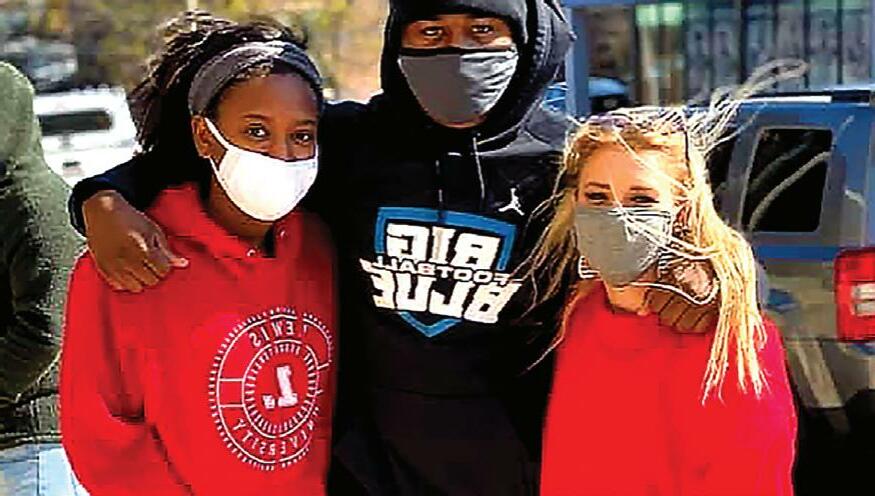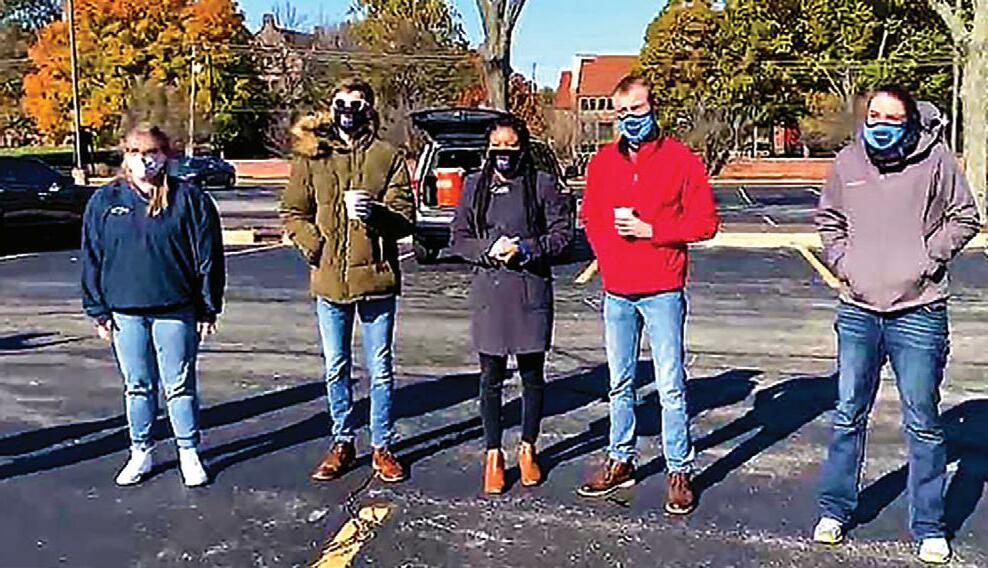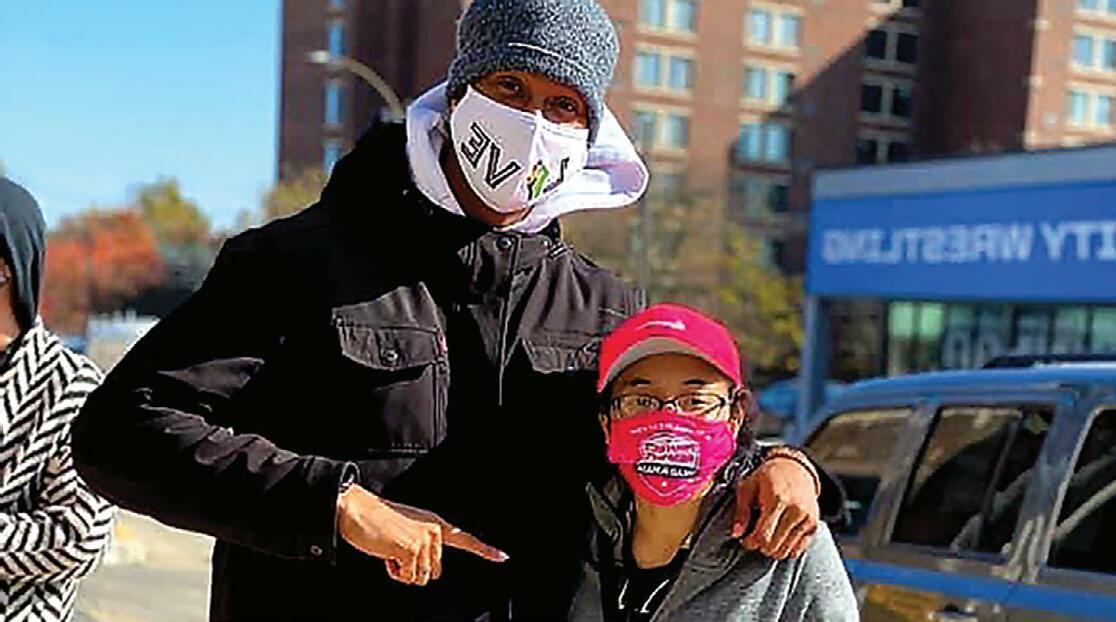
5 minute read
Conversations Make Community
By: Sydney Sinks
Millikin students and alumni are getting involved and creating a community they’re proud to call home. “There’s so much going on in the community that needs people’s attention.”
Advertisement
~Dominique Bates-Smith
After four years at Millikin, a lot of students find that Decatur becomes home. And what better way to honor your home than to improve it? In recent years, students and alumni have banded together with the Decatur community to organize protests, Facebook groups and nonprofits. As more issues come to light, these young people are doubling down in their devotion to
Decatur. They’re creating a better community and uplifting voices that need to be heard. Dominique Bates-Smith, an alum who was heavily involved with social justice initiatives while at Millikin, is the person behind a lot of this work.
In the summer of 2020, amidst the 22 BURST COVID-19 pandemic and the resurgence of the Black Lives Matter movement, Bates-Smith realized what she wanted to devote her life to helping others and giving back to her community. Since then, she’s been doing everything she can to follow through.
“There’s so much going on in the community that needs people’s attention, and seeing the way people are affected during the pandemic and then with the social justice movement, and then realizing — I have all this time on my hands. There should be no excuse not to

~walkitlikewetalkit.org
take action,” Bates-Smith says. “I really started to develop this kind of ideology or mentality, whatever you want to call it, that I’m tired of lip service, that actions truly speak louder than words.” While Bates-Smith works full-time for a local nonprofit, she also devotes equal energy to building Walk It Like We Talk It, the nonprofit she co-founded in 2020. “We try to get 17- to 30-yearolds involved in the community through social justice, community service, political engagement and mentoring,” Bates-Smith says. The group has organized events in support of voter engagement and the Black Lives
Matter movement. Members have also worked to advocate for peace and collect supplies for those in need, among several other initiatives.
“We have found that young people have a voice and want to get involved in their community, but adults just push them to the side and silence them,” explains their website, walkitlikewetalkit.org. “Walk It Like We Talk It does the opposite. We invite them to the head of the table.”
With this focus on young people, Bates-Smith and her co-founder, Millikin student Kamryn Harris, encourage students to get involved. They want to help students and other local young people engage with social justice issues and do what they can to help the community. “So many people talk about what they want to do or what they want to see, and I can definitely say I was one of those people,” Bates-Smith explains. “I realized you really got to back up what you say.”
Bates-Smith came to this realization after a Black Lives Matter protest at Millikin. During an interaction with Public Safety, Bates-Smith struggled to be heard. “That’s really where it changed for me because it was a moment where I felt, as a young, Black female, that I was being disregarded,” Bates-Smith says. She set up a meeting with Public Safety to address her concerns, and she left feeling satisfied and empowered. “If a moment like that . . . can lead to actual change on campus that can maybe impact students going forth — I was like, wow, maybe other things can happen.”
But to induce action, we need conversation. With this in mind, Bates-Smith decided to facilitate a space for people to talk through social justice issues and brainstorm solutions. She runs a Facebook group called Macon County Strong: No Place for Racism. (And her sister started The Girls of Macon County: Stand Up & Speak Up, a Facebook group against sexual violence, where people can share personal stories of survivorship, tips on recovery and resources.) The purpose of BatesSmith’s group is to bring people together and push for change.
“As humans, we all want one place where we can talk about these uncomfortable issues, but not be disrespected or put down,”

Bates-Smith says. “I started [Macon County Strong: No Place for Racism] as a way for people of color to have a safe space to talk about the racism they went through. What it turned into was that, but also a place for white people and other people of color to talk about things that they’re not sure about, to learn and to listen to people of color and then to talk about, ‘Okay, so what is it that we can do going forward?’”
Bates-Smith encourages people to use the group as a space to share their stories, connect with other people and learn about these issues. But she also fields messages from people who have upsetting questions about racism or beliefs that don’t align with hers. In these situations, Bates-Smith tries to respond with empathy.
“The biggest thing I’ve learned through doing this group and through all the work I do around racism and diversity is most of this negativity and different things, it’s not racism. Most of it is ignorance,” Bates-Smith says. She works with people to unpack this ignorance and educate them. That’s why she feels that the Facebook group is ultimately so important: It’s starting the conversation.
But unfortunately, she has found that it’s a lot harder to unpack systemic racism with people who aren’t as open to unlearning and relearning. While she has had some discouraging experiences, BatesSmith is determined not to stop her work. “That’s what people want,” she explains. “People who are equal, they want you to turn a blind eye. They want you to not be empathetic so that hate can continue to fester. And I don’t want to be part of that cycle. So I decided that even though it’s going to be hard, I have to keep creating these conversations.”
And that’s exactly what she’s going to do. Through these conversations and engagement with the community, young people like Bates-Smith are excited to make Decatur a better place. To get involved, visit walkitlikewetalkit.org or join Macon County Strong: No Place for Racism on Facebook.










